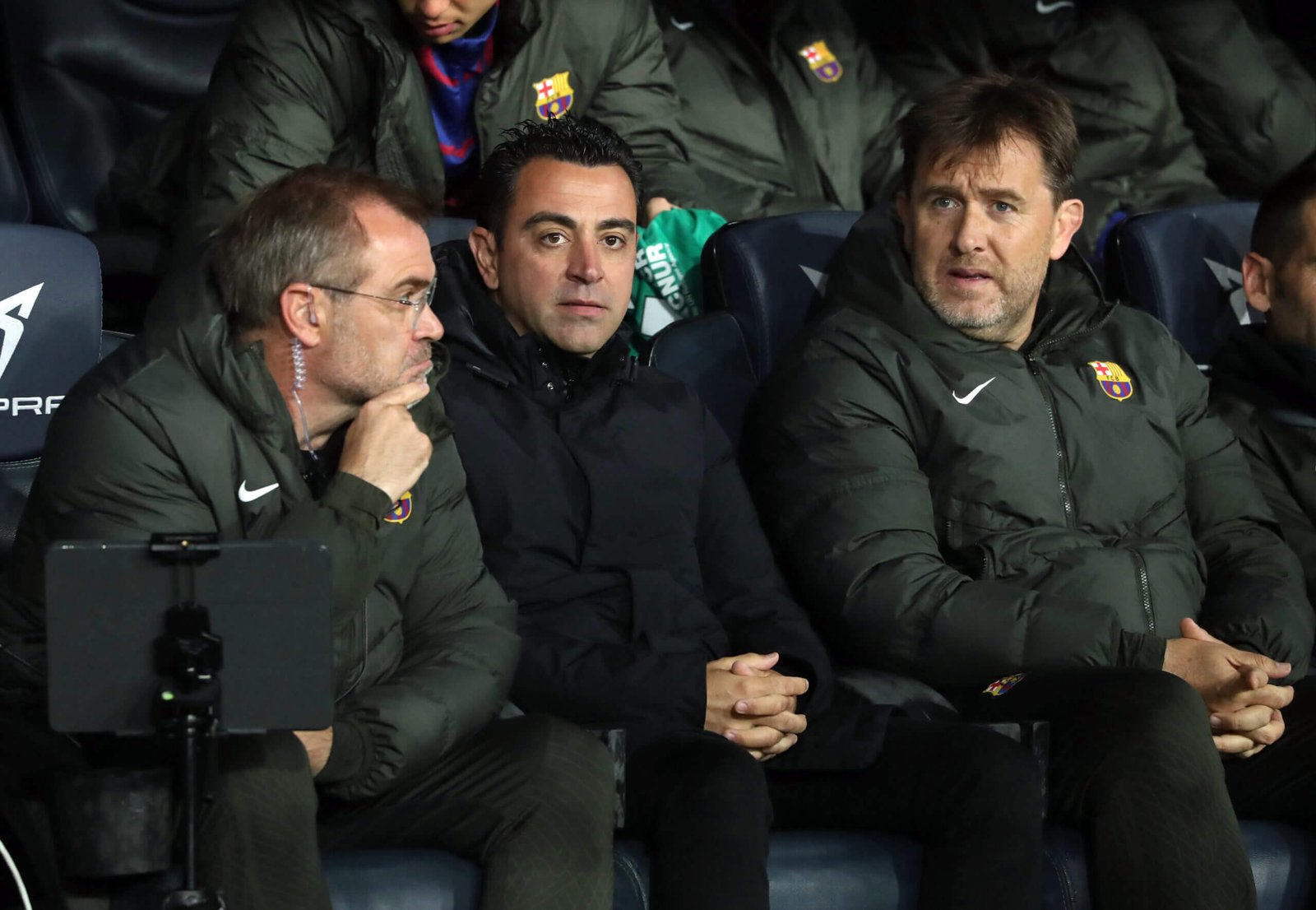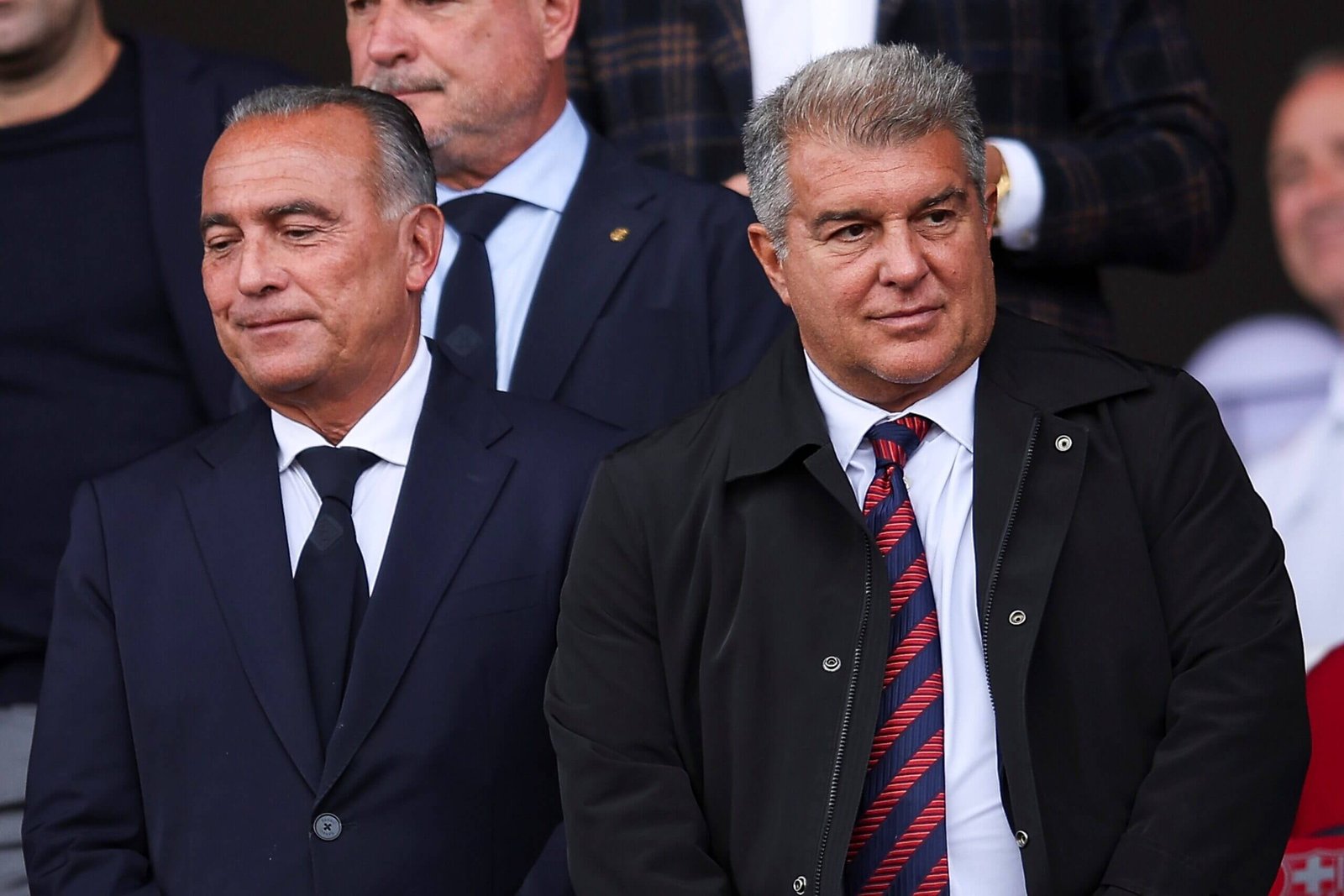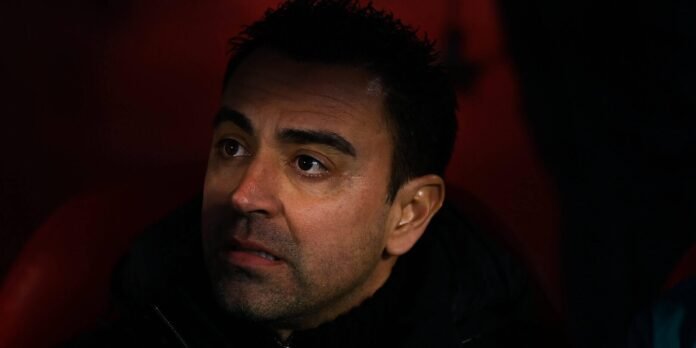Xavi woke up on Friday morning to rather unpleasant news.
While reading local Barcelona media, he came across a report that stated his club had already agreed personal terms with Hansi Flick to replace him. It added that the German manager would be officially announced on Monday.
This was news to the Barca manager — but he had been in the dark for the best part of a week.
During that time, club president Joan Laporta twice turned down requests from Xavi for talks, who wanted to address the rumours going around about his future. Instead, Laporta told Xavi they would have a meeting this Monday, the day after the season finishes.
By Friday, the 44-year-old had decided enough was enough. He knew that these reports would not be totally without basis. He called Laporta for a third time and insisted that a resolution had to take place that day.
Laporta agreed, so the president, sporting director Deco and executives Rafael Yuste, Enric Masip and Joan Soler all drove into Barca’s training facilities at around midday.
Several sources who were present — and, like all those cited in this article, wanted to speak anonymously to protect relationships — say the talks were not long, nor were they tense. Alongside Xavi was his assistant manager and brother Oscar Hernandez, as well as set piece coach Sergio Alegre.
Laporta quickly told the manager the club had decided to part ways with him — just a month after they decided to effectively reinstate him in the role.
The remarkable cycle was complete. Back in January, Xavi said he was going to walk away from a job he described as “cruel”, one that “wears you down”. Then the club wanted to change his mind. They succeeded, and just a month ago, Xavi appeared alongside Laporta and Deco; the trio presenting a united front that has very quickly unravelled behind the scenes.
How did we get to this point?
As bizarre as it may seem, a rather meaningless game against relegated side Almeria on May 16 will go down as the key moment.
Before that match, Xavi: “Barcelona fans need to understand we are in a difficult situation, especially on the economic side.
“Our financial situation is not the same as 20 years ago, when the club manager could say, ‘I want to sign this player, this player and this player’. And we got them all.
“The fans have to realise we need to adjust to this. I am doing it and we will do it together as a club. That does not mean we won’t compete. We will try our best.”
There is nothing factually incorrect about what Xavi said — Barca are still in financial trouble and their spending power is limited. But his words infuriated Laporta, according to sources close to the Barca president.
They said he felt “betrayed” by Xavi.
It convinced Laporta that Xavi should go — but in truth it should be best thought of as a tiny match lighting a long river of gasoline that extends further back still.
Let’s start with the evening of April 24. Laporta was on the phone, at home, ordering food from Parco — a renowned Japanese restaurant in Barcelona. Xavi, Deco, Yuste, Masip, Soler and Laporta’s advisor Alejandro Echevarria were present too.
They were celebrating the president’s decision to keep Xavi on as the Barcelona manager for the forthcoming season. For some, it was an unexpected outcome.
Multiple board members found out about the news on local media. The last time they had spoken to Laporta, earlier that very same day at a board meeting, they had been told that the likeliest scenario was that Xavi would be let go, regardless of whether he had changed his decision to resign.
Months before, back in December, several of Laporta’s closest advisors had started suggesting the idea of parting ways with Xavi at the end of the season (he had extended terms until 2025 in September), after a series of poor performances, both in La Liga and the Champions League.
Tensions grew further as Laporta intervened in Xavi’s squad selection for a Champions League trip to Antwerp, a match that followed a damaging 4-2 home defeat by Girona. Issue was taken with the fact Xavi granted his team three days off before the game, and then took the squad on a go-karting trip.
This tension contributed to the growing feeling of isolation that Xavi expressed in his announcement on January 27 in the fallout following a shock 5-3 home defeat by Villarreal, when he stated he could no longer carry on as manager and he would step down at the end of the campaign.
After this, Barcelona’s results began to improve. They went on a 13-match unbeaten run. Some began to call for Xavi to stay. Laporta was among them.
But despite publicly saying he wanted Xavi to reverse his decision in March, sources close to Laporta say Barca’s president later became convinced the club would be better off with a new manager. Sources close to Deco said the sporting director had come around to this view, too.
Deco, Laporta and Xavi together back in April (Adria Puig/Anadolu via Getty Images)
There were numerous factors for this.
Barca’s good form came to an end, with defeat by Paris Saint-Germain in the Champions League quarter-finals coming just before a second Clasico loss of the season at Real Madrid.
But older concerns had not disappeared either. There was frustration over a perceived lack of intensity in training sessions.
Sources close to Xavi and his team insist standards have been high, and that the club’s intense schedule has shaped their approach. Some board members have remained unconvinced, though, and, in January, Robert Lewandowski visited Xavi’s office to complain about the sessions.
Xavi’s opponents also felt it was revealing that, when the manager gave his players the Sunday off before their decisive quarter-final second leg at home to PSG, players still decided to come in and train themselves. All this played a big role in the club’s decision to bring in a new physical trainer, Julio Tous, for next season.
“He never fully switched his mindset from being a footballer to being a manager,” said one executive source, presenting his own view on Xavi’s transition to coaching. “When you are in charge of a dressing room you need to work a lot more, spend hours in the training facilities and know what’s best for the whole team.”

Oscar Hernandez (left) Xavi (centre) and Sergio Alegre (Joan Valls/Urbanandsport/NurPhoto via Getty Images)
Another big subject of friction among Xavi and Barca’s highest executives was the handling of Lewandowski and Vitor Roque.
Senior sources say Xavi recently asked the club to make an effort and try to sell Lewandowski next summer, as he and his coaching staff had doubts over the striker. They said the manager was told that the situation would have to be handled carefully, as there could be no guarantee of funds to bring in a proper replacement.
Despite this, Lewandowski has been subbed off by Xavi six times in the last seven league games. It caused tension with the player and Barca’s leadership thought their manager was acting recklessly.
With Roque, too, senior sources believe Xavi’s handling of the 19-year-old, who has seen first-team opportunities severely limited, have damaged the confidence of the player.
Xavi and his coaching team were acting boldly in both cases, with knowledge that their decisions were not appreciated by some higher up. He was also being more open, and more direct, with criticism of his players.
In a match against Valencia in April, Raphinha had a heated exchange of words with the manager’s brother and assistant, Oscar, when he was taken off. After the final whistle, Xavi reprimanded Raphinha and told him he would not play the next game as “there are attitudes that can’t be allowed”.
A week later, after Barca lost 4-2 at Girona, a result that handed Madrid the title, Xavi said he was “sad because the team has made a lot of mistakes this season”.
He added: “We, the coaching staff, prepare the game plans so well, but it is individual and punctual mistakes that have defined our campaign. That’s how we gave up the league title.”
Tellingly, as Xavi appeared in front of the media microphones, Laporta, Deco and other executives held an improvised meeting outside of Girona’s Montilivi stadium. They were easily spotted by photographers.
“They want to be seen, I guess,” said a club worker at the time, when asked why they would be having a meeting in what was essentially a public place. It was an image that, in the Barca media, fueled the final rush of uncertainty over Xavi’s role.
Another executive source says: “Some told the president, ‘We warned you’ after the display at Girona.”

Yuste (left) and Laporta (right) (Eric Alonso/Getty Images)
That result was a turning point. And in recent weeks, club sources say further tension has grown around Xavi’s comments on summer transfer planning — with the manager, in their view, describing unrealistic targets to the media.
This is where we come back to those Almeria comments that so angered Laporta — and why he felt “betrayed”.
“In that meeting at Laporta’s home, the president asked Xavi how much he believed in the current squad at Barcelona,” a senior club source says. “He replied his confidence was very high, that the spine of the team was really good and that it just needed a few changes to make it competitive again.
“That does not tally with the narrative he sold in the media the weeks after.”
Laporta was not expected to sanction Xavi staying on that day. It was the power of the speech he made with the president at his city-centre apartment, that kept him in the job.
With Xavi now set for one final match in the Barca dugout — in Sunday’s trip to Sevilla — everyone is fully aware that Xavi has not truly been in a position of strength for some time. Many have asked the question: would it not have been better to have let him go last month?
“It is not easy to be ruthless and part ways with a club legend,” says a senior source, who also referenced how Laporta’s perceived mishandling of Lionel Messi’s and Ronald Koeman’s exits played a part in the emotional decision he took a month ago.
A case can be made in which, deep down, Laporta never fully trusted Xavi. He was not ‘one of his team’.
Xavi was not a part of Laporta’s football structure during his 2021 candidacy to become Barca president, and Laporta said back then he was not considering him as their next manager. Instead, Xavi was the central piece in rival candidate Victor Font’s project.
Laporta only turned to Xavi as an emergency solution when Koeman was sacked. It was a convenient agreement for both sides of the deal: Xavi got his dream job and Laporta a well-loved new face to lead the club’s project at a tough time.
“If you know Joan (Laporta), you know that deep inside he does not forget Xavi wasn’t with him at the start,” a close contact of the president says.
Barcelona will finish second in La Liga, behind an impressive Madrid side. They made progress in Europe, reaching the last eight for the first time since the 8-2 mauling by Bayern Munich in 2020. But Xavi is leaving after what can only really be considered a bad season, with little sense of progress towards how he wanted his team to play, and amid great turmoil. Flick is set to replace him.
According to club sources, Barcelona had planned to delay their meeting with Xavi until Monday to avoid any distractions before the Women’s Champions League final Barcelona play against Lyon on Saturday evening.
Barca fans will hope the turbulence of recent weeks does not claim another victim.
(Top photo: Juan Manuel Serrano Arce/Getty Images)
Read the full article here


